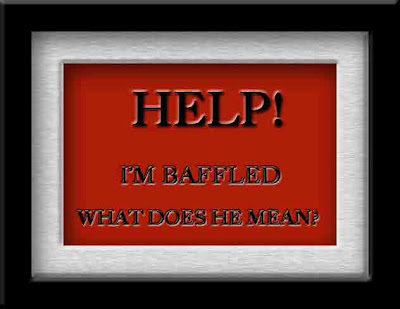 I received a note with the subject line: HELP! I’M BAFFLED. WHAT DOES HE MEAN?
I received a note with the subject line: HELP! I’M BAFFLED. WHAT DOES HE MEAN?
Now who can resist stopping to read a note referenced like that? So I did–stop, that is–and read the note. It was from an author who had received a rejection from an agent. In the note, he said that the villain didn’t scare him. That’s an important factor considering this is a novel targeted at the thriller market.
The author was confused by it. The villain purportedly had all the makings of a convincing villain. So the agent’s comment baffled the author, leaving her confused and floundering, trying to determine what was wrong with the villain.
I couldn’t resist. From the character sketch, two things were apparent:
1. The villain was capable of villainous acts.
2. The villain was weak and I didn’t fear him, either.
Here was the problem. He was totally evil. No redeeming quality. That makes him weak–and it diminishes suspense because we know to expect his worse and about what his capabilities are going to be.
That’s a challenge. To fear a villain, we need to be uncertain how far he’ll go–or know how far he’ll go and fear he’ll go even further. In other words, he needs to be a little unpredictable.
He also needs to be motivated. Doing what is normal and right and good TO HIM. Even if that’s twisted and crazy and totally nuts. To him, he makes perfect sense and his reason for doing what he’s doing is one we understand even though we consider it twisted.
That means it typically ties to a universal emotion. Why? Because we identify with universal emotions. This gives the villain credibility as a villain.
Lacking those qualities, the villain is weak and because he’s weak, he also diminishes the heroism and admirability of the story’s hero. If the villain were smart and strong and sharp and clever and cunning and oh-so-good at being a villain, then the hero would have to be even better to win in an adversarial match against that villain. Because the villain isn’t those things, the hero can’t be heroic. So his character is weakened, too.
A hero is only as good as his villain makes him.
Regardless of the novel type, that’s an important point to remember in crafting characters.
I try to make the villain as dastardly as I can for some emotional reason. Then I think on him until I find a way to make him worse. After I’ve made him as awful and as strong as I can, then I give him some extra perk that makes him even more terrifying to me. And seat that perk in universal emotion.
Remember, a killer killing isn’t interesting. Why a killer is killing and if he is successful at killing in the face of someone fantastic trying to stop him from killing–now that’s interesting.
Writers have a tendency to eliminate obstacles when they run into situations like this. To eliminate the obstacle or conflict when they should be doing the exact opposite–making it harder still on everyone involved. Putting the outcome in greater doubt.
This brings to mind BODY DOUBLE. In chapter 1 a woman is sealed into a tomb alive. She awakens and digs her way out, makes her way to safety, and is retrieved by an operative. That’s a pretty formidable enemy who can do that. And some would say it’s enough. But…
The operative who retrieved her informed her she hadn’t been missing for three days–as she thought. She’d been missing for three months–and she has no idea where she’s been.
Now that further complicated the matter–and it intrigued the heck out of me. Only one thing worried me. I had no idea where she’d been, or what had happened to her, or why she didn’t remember it.
I had to write the story to find out. And, boy, did I have a blast doing it!
So that’s another perk to complicating matters up, even when you think you’ve complicated yourself right into a wall. You’re creative, you’ll find a window–or make a new one. And when you do, you’ll enjoy discovering these wrinkles and intrigues as much as the reader.
And you shouldn’t get notes such as the one above on future submissions.
Blessings,
Vicki
P.S. There are two articles in the website library (www.vickihinze.com) that might be helpful on this: Villains and The Fictional Dream. You might review deepening conflict and the articles on character, too.
Tags: author, writer, writing, villain, character, conflict, fiction, novelist, vicki hinze, writers library




